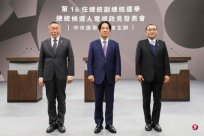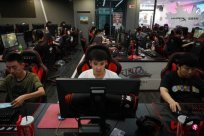The "Sino -Thai Rui Xing's dispute", which lasted two years, has also appeared in a dramatic reversal this week. China's largest chain coffee shop brand Ruixing Coffee sued the coffee shop in Thailand and loses the previous month, on Tuesday (December 19th (December 19th) Against Thailand Ruixing sued 10 billion baht (S $ 382 million).
The counterattack of Ruixing in Thailand caused heated discussion among Chinese netizens, and the incident once appeared on Weibo.China Ruixing also helplessly posted on Weibo to respond to "I can't understand, but I am greatly shocked."
To understand this intricate infringement lawsuit, it has to be traced back to 2020. Before Ruixing entered the Thai market, the Royal Thai Royal 50R Group (referred to as 50R) had registered the Ruixing trademark with the Ministry of Commerce of Thailand andApproved to use the trademark to operate coffee shop business.
The next year, China Ruixing Coffee, which began to laid out the Thai market, filed a lawsuit to the central intellectual property rights and the International Trade Court of Thailand, accusing the 50R malicious registered trademark, and the primary court ruled that 50R lost.However, 50R refuted to the court and won the lawsuit on December 1 this year.
50R chase within three weeks. This week, when the Thai court accused China Ruixing who had not made a final judgment in the court, the group repeatedly forced the group to stop the Ruixing trademark and repeatedly seized its property, causing serious serious ones, which caused serious serious seizures, causing serious serious seizures, causing serious serious seizures, causing serious serious ones, causing serious seizures, causing serious serious ones, causing serious serious ones, causing serious serious seizures, causing serious seizures, causing serious seizures, which caused serious serious seizure, causing serious serious ones, which caused serious serious seizure, causing serious serious ones, which caused serious serious seizures, causing serious serious seizures, causing serious serious ones, causing serious serious ones, causing serious serious ones, causing serious serious ones, causing serious ones, causing serious ones, causing serious ones, causing serious ones, causing serious ones, causing serious ones, causing serious ones, causing serious ones.For economic losses, the company also spent a lot of costs for lawsuits; 50R Group claimed to China Ruixing on the grounds of this.
The fiercely competitive catering industry in China has a serious cottage problem in the long run, but the cottage and being cottage in the catering industry have undergone obvious changes in the past ten years.Domestic operators draw on domestic brands and further expand to foreign operators to learn from domestic brands.
Recalling the scenario of traveling to China more than ten years ago, at that time, various strange Pinyin cottage version of Western -style fast food restaurants on the streets of the second and third tier cities at that time left a deep impression on me.
In the past ten years, such a scene has become increasingly rare.As China's own catering brands are gradually mature, the cottage operators in China will no longer only focus on foreign catering brands, but use domestic catering brands as the target of plagiarism.This situation is still serious even now.
The annual Meituan merchant brand protection report released by Meituan last year showed that in 2021, the Meituan platform took the initiative to intercept more than 6.06 million suspected infringing stores and products, an increase of 200%year -on -year; the handling of infringing stores and goods reached 100,900,000Second, there were more than 720,000 complaints for infringement, and 43,000 offline infringement stores and goods were offline.
In the past five or six years, the internal concerns of Chinese catering brands have been further expanded into external problems.The situation of Ruixing's abroad is not an example. As Chinese catering brands began to look at overseas, many operators found that the brand had been copied before they went out.
In 2019, Chinese students in South Korea registered the "Tea Yan Yue" trademark in the local area, and opened milk tea shops in South Korea with almost the same brand trademark.The well -known Chinese catering brands such as Tai Erma, Little Sheep, and Grandma's Family also appeared overseas twins in Canada, the United States, Malaysia and other places.Among them, many overseas plagiarismers are Chinese or Chinese immigrants who are familiar with these Chinese catering brands.
This means that these Chinese brands that are just prepared to show their feet overseas have not yet stepped abroad, and they have been restrained in an important market.
The infringement cases of China Ruixing and Thailand Ruixing attracted greater attention by the reason is that the great reason is that Chinese players have changed their offensive and defensive positions on the cottage issues.The legal loopholes and development problems are therefore revealed.
In the past few decades, China has been labeled by the outside world as a "cottage country". The problems of Chinese enterprises and the people's awareness of intellectual property rights are often criticized by the outside world.
In recent years, China has focused on promoting the transformation from a labor -intensive economy to an innovation -driven economy and seeking the ladder of climbing into the industrial chain; strengthening intellectual property protection has gradually become an important foundation for China's economic development.
On November 30, 2020, Chinese officials proposed that when presiding over the collective study of the Politburo of the Communist Party of China, it was proposed that intellectual property protection work is relatedThe overall situation, related national security, shows the strategic importance of intellectual property rights.
China is working hard to turn from the "cottage country" from the outside world to become a great innovation country. Chinese catering brands have been plagiarized overseas; from the side, it reflects that the image of Chinese corporate brands has been significantly improved.The transformation of China's transformation has indeed achieved results.
Driven by the official promotion, Chinese enterprises and the people have strengthened their awareness of intellectual property protection. In high -cost areas such as technology products, plagiarism has been significantly reduced.However, the catering industry with a low cost of plagiarism is a vane of China's overall intellectual property awareness level -China has the power to cultivate mature catering brands, but at least in the catering industry, the industry's awareness of intellectual property protection has not yet matured to mature.Expect.



